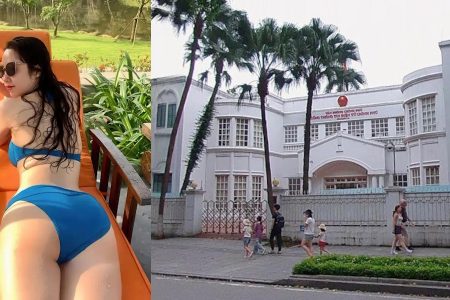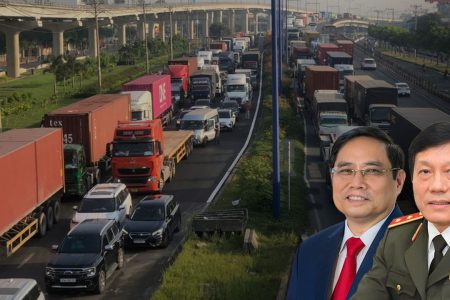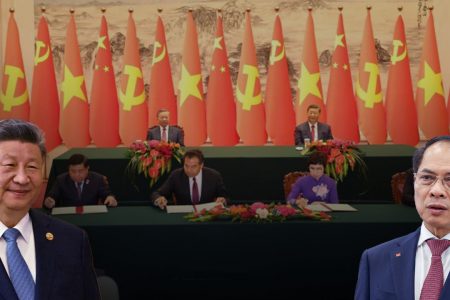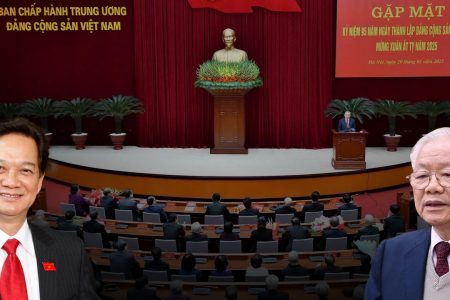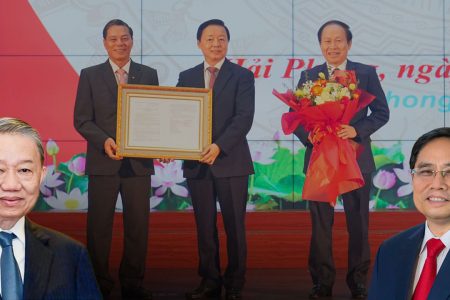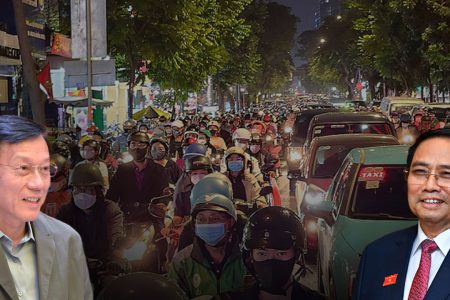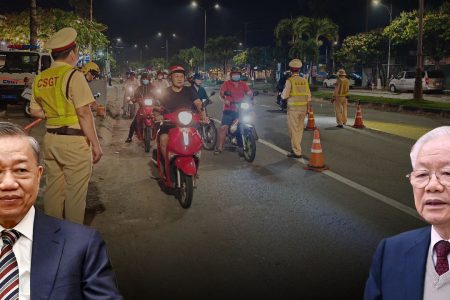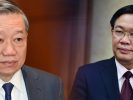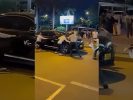The article entitled “Some issues need special attention in the preparation of personnel affairs of the 13th Party Congress” of General Secretary Nguyen Phu Trong was published in the media in Vietnam on April 26.
“Personnel work” was emphasized by the leader of the Communist Party of Vietnam after three days of his speech at a national cadre conference on April 23 and the Secretariat has just directed to resume congresses of party’s organizations in the communal, district provincial levels after more than three weeks of temporary suspension due to the Covid-19 outbreak.

In the article, Trong said that “our current staff is crowded but not very strong, the situation of redundancy and lack of staff still happens in many places” and “lack of leading officials, top managers, scientists, and industry experts in various fields.”
“A number of leading and managerial officials, including senior officials, lack of exemplary, low reputation, quality, capacity … entanglement in corruption, waste, negative, group interests , taking advantage of loopholes in mechanisms, policies and laws, intentionally doing contrary, seeking personal profits, causing great loss of State capital and assets, causing serious consequences, being disciplined by the party and criminally charged.
“Only from the beginning of the XII term up to now, the Central Committee, the Politburo, the Secretariat, the Central Committee for Inspection have had to discipline nearly 100 senior officials under the management of the Central Committee, some officials have been criminally convicted,” Trong wrote. “Illegal lobbying for official posts, falcificating degrees and awards are rampant as state and party officials are working for their own interests, ignoring integrity and honor.”
Mr. Trong mentioned the time of transferring the old generation to the new younger one which consists of cadres trained from different sources and countries with “different political institutions.”
The Vietnamese leader emphasized what he called “unsettling manifestations” of “the ideological situation in the Party and the mood in the people” whereby “corruption, shortcomings in a part of cadres, Party members and civil servants have only been initially prevented and repelled with modest results.”
Trong raised the phenomenon of officials “becoming rich quickly with many houses and lots of land.”
“How is the Party planning to select and arrange the leaders of the Central Committee, the Politburo, the Secretariat, especially the key cadres to be able to carry out the great revolutionary tasks? entrusted history?” Mr. Trong asked and included the introduction and selection criteria that he said was clearly “extremely important but also very complicated, difficult and heavy.”
Members of the 13th Central Committee, according to Trong, “must have both good morality and talent, of which morality is the root.”
While Trong emphasized his determination not to miss those who are truly virtuous, talented, and qualified, he does not want to the 13th Central Committee to have members who “had one of a series of defects.”
The words “corruption” and “group interests” are mentioned in his article and the general secretary warns about the composition of “political opportunity, power ambition, flattery, paying in exchange for being promoted.”
Mr. Trong described the subjects “declaring property in an untruthful manner, showing signs of getting rich quickly, having many houses, lots of land and many other assets without clearly explaining the origin; himself or his wife, husband, children leading a luxury life, taking advantage of power to gain illicit profits “is a component that cannot be included in the Central Committee.”
Mr. Trong, head of Personnel Sub-Committee of the 13th National Party of Vietnam, said that “letting those [unqualified] in the leadership position is a disaster for the Party, is to create conditions for them to cause more harm the country, the more damage to people.”
According to him, the party needs to work on the personnel maters for the Politburo and the Secretariat and key leaders after forming the Central Committee. He warned “against the main negative manifestations right in the responsible officials, the Congress delegates and members of the Subcommittee [Human Resources Congress 13] and the support group of this subcommittee.
Trong also talked about the principles of “collective leadership” and “collective leader.”
“Avoid the situation of negative morality, no coordination, undermining others. Our purpose, our responsibility is to build strong Central Committee, Politburo, and Secretariat, truly united, highly united around the party’s leader,” he concluded.
With the complicated situation of the Covid-19 pandemic, in order to focus all resources on disease control and avoid large crowds, the Central Committee has instructed to delay congresses of the grassroots level.

Domestic observers have commented on whether the focus on anti-pandemic may have an effect on the fight against corruption within the Communist Party and government.
Nguyen Huu Vinh said: “It is clear that the general atmosphere of the whole society in recent months has focused heavily on combating disease. The state-run media mainly writes about the pandemic. Since March, the Supreme Court has also sent instructions to the court nationwide to suspend hearing cases. Then there was the next order to stop until April 15.
For example, in the 17th meeting, in January 2020, there were targets set for 2020 to end investigating 21 cases, … prosecuting 23 cases … Besides, there are 5 other key tasks, which are difficult to be implemented.
Once the achievement set before the 13th congress is not achieved, it is not difficult to see its impact on the most important stages of the congress, including personnel issues.
For the time being, as in the case of Thu Thiem land dispute, if you do not make it in time, relatively thoroughly before the congress, then may some cadres responsible for the case may be selected to the Central Committee but later they may be arrested.”
Blogger Nguyen Huu Vinh made a comment.
Commenting on the independence of the Vietnamese judicial system regarding the Communist Party’s anti-corruption incineration, Lawyer Le Cong Dinh said: “In fact, the Vietnamese court system has never been independent since the party has taken power.”
The “theory of the rule of law” that the CPV has introduced since the countries of the socialist bloc have been transformed into democratic, does not recognize the concept of three-branch power separation.
In the past, the CPV always concentrated all state power in its hands, interfering in all activities of the state apparatus, including judicial function.
That bad precedent has actually been a constant practice for a long time, not just from the last two terms of Party Congress.
Therefore, the instructions of the senior leadership of the CPV on “burning furnace” are all done in accordance with the inherent principles of their rule.”
Mr. Nguyen Huu Vinh said:
“First of all, we have to say the proverb nowadays, that the ‘pocket sentence’ goes on persisting in the Vietnamese judicial system, which is rarely seen by the state press to dissect it.
More specifically, when carrying out a case, the trial is the final step, the judiciary must be thoroughly aware of how to minimize damage to the party’s prestige and ideological stability of the people. Ordinary people are cherring for every arrest of senior officials and ministers. But if the case didn’t stop there, let the arrested officials may testify some higher officials, especially when they were sentenced to heavy sentences . It would be disater for the regime.
In recent years, the fight against corruption has been pushed up, bringing some results in big cases.”
Thus, it is easy to see that the judiciary must try to fulfill the set goals, must brace themselves, while the qualifications and manpower are limited; The legal system is still gaping and overlapping; complex internal politics with shady, mutually supportive relationships, and so on. And so, it is easy to result in trial with unjust judgment or injustice.
Recently, the former Minister Nguyen Bac Son admitted that he had received a bribe of $ 3 million, the press was cheerful, many people were happy, and it was a historical event, a great achievement for the judiciary … In fact, such a bribe/offer is entirely from interrogation, not an investigative agency.
Attorney Le Cong Dinh said that:
“When exhorting anti-corruption, the Communist Party of Vietnam always calls for the participation of the masses in this joint work, but that is just a simple statement.”
In fact, they never allow people to actively fight corruption, and always emphasize the party’s leadership role in the fight against corruption, but actually anti-corruption oriented and serves for fraction fighting within the party.
Nguyen Huu Vinh commented:
“For a long time, the role of the people in contributing ideas to build the country in general and fighting against corruption in particular has not been taken seriously. Words with too much propaganda, but in fact too few. The obvious reason is that the party does not want to “show the back of the shirt,” always afraid of not controlling the situation, once empowering the people to supervise the party.
People are afraid of retaliation when they want to report corruption to the responsible authorities. If they want to go through organizations and unions to be safer and more powerful, they cannot because they know that these organizations are just an extension of the party, also full of corruption. So corruption is becoming more and more popular, the prestige of the party with the people goes down, the risk of survival is greater.”
Commenting on a number of comments that require Publicity, Democracy, Diversification Against Corruption Mr. Dinh said: “The request to publicize and even democratize the fight against corruption has been long-established and got bigger support from ordinary people but it will not be respected.”
“The guiding principle of the Communist Party of Vietnam is the concentration of democracy, but in reality it is only the authoritarian focus and the elimination of democracy.
Therefore, as I mentioned above, the current fight against corruption is driven in a more deliberate direction and has a more internal factional fighting color than a movement of the whole society.
All final decisions are made by one person only, so the organization of the implementation depends entirely on his or her health.
Sometimes, the state-controlled press publishes information about state officials being prosecuted for their shortcomings.
All processes are lacking transparency,” lawyer Le Cong Dinh made a comment.
Nguyen Huu Vinh said:
“It is impossible to democritize the fight against corruption “but not to democracitize many other issues of the state, from city planning, project bidding, … to cadre evaluation etc. .
Can not “democratize” only the “anti-corruption” without democracy in contributing ideas to the law, strengthening the purification of the judiciary, … even the policy line of party.
So once the anti-corruption is done by the (leader) of the party, the people sit and watch, or applaud, the result will certainly be very low, and it is easy to be suspected of using the main anti-corruption to solve internal problems.
The Communist Party has ruled the Vietnamese people for more than 75 years, but nearly a century of rule has passed, but the Party is still confused and increasingly bogged down in difficult issues, because of the reasoning they apply have become outdated which led to being manipulated by groups, relying on party members to corrupt, steal the public, exploit people badly.
What can be done at this time, is that the Party should soon return the basic rights to the people to build a rule of law, Democracy and Freedom state.
Hoang Lan from Hanoi – Thoibao.de (Translated)



